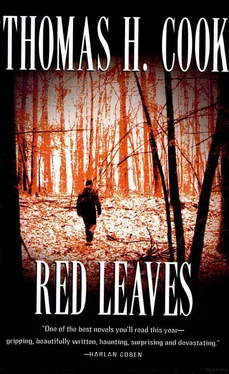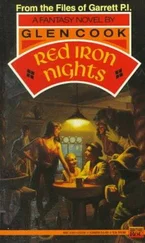"We've called a lawyer," I said.
The blue eye gave nothing away.
"Leo Brock," I added. "He's coming over in a few minutes."
The blue eye stared at me without sparkle, a tiny pool of unmoving water.
"I need to talk to you before he gets here."
Keith's voice was emotionless. "What about?"
I looked at the slowly blinking eye and wondered if Keith had taken something, inhaled something, if this, too, was a part of him he had hidden from me.
"Open the door," I said.
The door remained in place.
"What do we need to talk about?" Keith asked.
"Keith, open the door," I insisted.
He hesitated briefly, then drew back the door, but instead of ushering me into his room, he came out into the corridor and quickly closed the door behind him.
"Okay," he said. "Talk."
I looked at him closely. "Are you okay?"
He laughed softly, almost mockingly. "Yeah, great," he said.
"I mean are you ... able to talk?"
He shrugged comically and grinned at me, but it was a cold grin, like a bitter clown. "What do you want, Dad?"
"I want you to tell the truth, Keith," I said. "When Mr. Brock comes over here. Whatever he asks you, tell him the truth."
"Like with the cops," Keith said.
"Like I told you to do, yes."
Again, he shrugged. "Okay ... so?"
"The truth," I repeated, this time sternly.
"The truth, right," Keith said. His eyes narrowed slightly. "Is there something else?"
"In every detail," I said. "What you did while you were at Amy's. Where you went after that. How you got home. The truth, Keith."
"Yeah, okay." He waved his hand, as if batting away a pesky insect. "Can I go back now?"
I told him that he could, then watched as he slunk back behind the door and returned the bolt to its place, sealing himself off again.
Downstairs, Meredith was sitting at the kitchen table, drinking coffee, her long fingers fidgeting nervously with the top button of her blouse.
"What did he say?" she asked.
"Nothing."
She took a sip from the cup. "Typical."
"What do you mean by that?"
"It's the same way he acted when we told him Amy was missing. No real reaction. A shrug. Like it was nothing."
"He didn't know how to react," I said.
Meredith didn't buy it. "I don't know, Eric, there should have been some little expression of sympathy ... shock ... something." She took another sip of coffee. "He didn't ask a single question. Did you notice that?"
"He's afraid," I told her.
She drew in a quick agitated breath. "So am I," she said.
I could see that clearly, her fear, and in that first visible dread, felt the touch of something yet more dreadful still.
"Are you all right?" I asked.
"How could I be all right, Eric?" Meredith asked. Her voice was edged in sarcasm. "How can anything be all right?" She took an angry sip from the cup, grim, resigned, though I couldn't tell if this resignation had to do with Keith or me or herself, or just the life that was hers, the whole course by which she'd come to rest in a shitty little town.
I had no answer for her, and so I did what we often do when things seem beyond us, wrapped in total darkness, when we sense the approaching precipice.
I reached out blindly and took her hand.
EIGHT
Leo preferred to meet Keith at our house rather than at his office because, as he told Meredith, "Kids are less jumpy on their home turf."
We'd known Leo for nearly fifteen years. When the time had come to buy the shop, I'd picked his name out of the local phone book, and he'd conducted the closing with such effortless competence that he'd handled all our personal and business affairs ever since. More recently, he'd also become something of a family friend. His wife, Peg, had died three years before, and since then Meredith had made a few attempts to match him up with various faculty members at the community college. Leo had never once called any of these women, however, and Meredith had finally gotten the message that he simply did not want to marry again. He was happy as a sixty-two-year-old widower, free to do as he pleased, take off on a whim.
He arrived at precisely 3:15, dressed in his customary jacket and tie, his shoes polished to a gleaming sheen.
"Hello, Eric," he said when I opened the door.
I led him into the living room, where Meredith sat at the end of the sofa, her long legs primly crossed, hands in her lap, a rigid posture Leo noticed immediately.
"I know this is very disturbing," he told her as he sat down on the sofa. "But, believe me, it's much too early to suggest that Keith has anything at all to worry about." He glanced around the room. "Speaking of which, where is he?"
"In his room," I said. "I thought you might want to talk to us first."
Leo shook his head. "No, Keith is actually the person I need to talk with."
It was a clear instruction to summon Keith downstairs.
"I'll get him," Meredith said. She rose and headed up the stairs.
"This is all very strange," I said after she'd left the room. "Keith involved in something like this."
"Naturally, it's worrisome," Leo said. "But nine times out of ten, everything can be cleared up very quickly."
"You've handled this kind of thing before?" I asked.
Leo leaned back casually. "What kind of thing is that?"
"A kid accused of something," I answered.
"Has Keith been accused of anything?"
"Not exactly but..."
"But what?"
"Well, he was the last person to see Amy."
Leo shook his head. "No, the last person to see Amy was the guy who took her." He looked at me significantly. "You need to keep that distinction firmly in mind, Eric."
I nodded obediently.
Meredith returned, Keith dragging along behind her, looking tense, like someone already tried and found guilty who was now only awaiting the judge's sentence.
"Hi, Keith," Leo said brightly. He rose and thrust out his hand with the exuberance of a patriot welcoming a soldier home. "You look like you're holding up just fine." He glanced at me, then offered Keith a wink. "Not like your old man, huh?"
Keith smiled, but it was a smile I'd seen before, mirthless and rather resentful, as if the whole thing were a dreadful inconvenience, something he had to go through before he could get back to his computer game.
"Have a seat," Leo said as he lowered himself back onto the sofa.
Keith sat down in the chair across the narrow coffee table. He looked at me, then back at Leo. In his eyes I saw nothing but a dull determination to endure the next few minutes, then slink back to the dark burrow of his room.
"So, I hear the cops came by," Leo began. His tone was light, almost chatty. He might have been asking Keith about a favorite movie. "They stay long?"
Keith shook his head.
"Good," Leo said. "They're not much fun to have around, are they?"
Again, Keith shook his head.
Leo flung one hand over the back of the sofa and with the other unbuttoned his jacket with a great show of casualness. "What'd they want to know?"
"About Amy," Keith said with a halfhearted shrug.
Leo's next question was carried on the back of a slight yawn. "What'd you tell them?"
"That I put her to bed at around eight-thirty."
"And that was the last time you saw her?"
"Yes."
"When did you leave Amy's house?"
"When her parents came home."
"And that would be?"
"Around ten."
Leo leaned forward with a soft grunt and leisurely massaged his ankle. "Then what?"
For the next few minutes, I listened as my son told Leo the same story he'd told the police—that he'd gone into the village, wandered the streets, lingered awhile at the ball field, then walked home. As he spoke, I let myself believe that he might actually be telling the truth, that perhaps I was wrong and hadn't really heard a car stop on the road that night, watched its lights sweep through the undergrowth, then draw away. I'd seen other parents find ways to deny the horrible possibility that their son or daughter might have done a terrible thing. In the past, the way they'd demonstrated such blind faith in their child's innocence had amazed me. But suddenly, when Leo turned to me and said, "Were you awake when Keith came home?" I knew that I was now one of those parents, willing to do or say or believe anything that would hold back the grim tide of doubt.
Читать дальше












